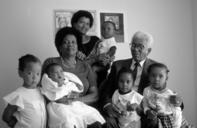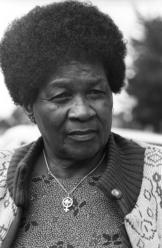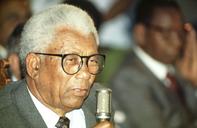South Africa's Most Famous Family
The Mandelas are probably South Africa's most famous family, and yet they are only one of many families that have made sacrifices in the fight against apartheid. Few have made more sacrifices than the Sisulu’s have.

Head of the family Walter was jailed together with fellow Sowetan Nelson Mandela in the famous Rivonia Trial of 1964. As the Secretary-General of the ANC, he received a life sentence for treason. After 25 years in prison, he was released in October 1989.
Son Max and daughter Lindiwe, an ANC activist, lived in exile until apartheid was disbanded. The eldest son Mlungisi was first arrested at the age of 12 while attending his father's trial. Later he was a long-serving prisoner on Robben Island.
The youngest son, Zwelakhe, a trade unionist and journalist, is a former Nieman Fellowship scholar at Harvard. He is the editor of the alternative newspaper New Nation but has been banned from practising his profession. For much of his adult life, he has been in and out of jail as a political detainee but has yet to come to trial. From 1980 to '83 he was a banned person — one who ceases to exist, according to the Draconian laws of the state.
The Sisulu Matriarch

Matriarch Albertina is an honorary president of the United Democratic Front (UDF) and a leading force in the Federation of South African Women. She has been a political campaigner since the 1940s when, on her marriage to Walter Sisulu, she was told that she was 'marrying someone who was married to the nation'. Mrs Sisulu has seen her share of the inside of state prisons, but her will to fight injustice is steadfast.
Albertina had no political leanings when she met Walter, but as his partner she was soon initiated. She was the only woman present at the meeting when the Youth League was formed. The inspiration she gained from political speeches then led her down a long road of political activism that still has no end in sight.
As a leader of the UDF she has helped to bring together old-time community leaders as well as a new generation of activists, both black and white: ‘The feeling is that we are all here to stay’, she says. Although she managed to raise seven children, her life was severely hampered by a long-term banning order and long periods in jail.
In 1988 the Sisulu’s were awarded the Carter-Meinl Human Rights Prize for ‘giving hope to all South Africans who oppose and suffer under the unjust system of apartheid’ - a fitting reward for a courageous family.
The Sisulu Patriarch

Like Nelson Mandela, Walter Sisulu was born in Transkei in 1912, three months after the formation of the ANC. He left school after standard four and went to Johannesburg to work on the mines. He began to write for the black media and joined the ANC in 1940.
With others like Nelson Mandela, Oliver Tambo and Govan Mbeki he became disillusioned with the organization’s moderation and so helped form the Youth League in the early 1960s, an organization committed to armed resistance as a means of change.
During this time he studied to become an attorney. In 1960 he was banned as a communist - something odd for a person committed to democratic government - and in 1963 he fled his Orlando West home, reappearing months later at the sensational Rivonia Trial.
 Albertina Thethiwe first met Walter Sisulu when she was working at Johannesburg General Hospital in 1941. He was a young political activist...
Albertina Thethiwe first met Walter Sisulu when she was working at Johannesburg General Hospital in 1941. He was a young political activist... Albertina Sisulu, affectionately called the Mother of the Nation or Ma Sisulu, is best known for being a South African anti-apartheid activi...
Albertina Sisulu, affectionately called the Mother of the Nation or Ma Sisulu, is best known for being a South African anti-apartheid activi...